Egypt
Over 748,000 refugees and asylum-seekers are registered with UNHCR Egypt, a majority of whom are women and children who have recently arrived in Egypt fleeing the brutal conflict that started in Sudan in April 2023. Since the conflict broke, the registered Sudanese refugee population has grown almost sevenfold and numbers are expected to keep rising.
With needs growing exponentially, resources are running thin for the Government of Egypt, UN agencies and other strategic partners to provide refugee and host community children with safe, protective quality learning spaces.
The 2024 Sudan Regional Refugee Response plan calls for $109 million to respond to refugee education needs across the region. To date, only 20 percent of this amount has been mobilized, including $4.3 million – or 40 percent of the requirement for Egypt.
On a high-level UN mission to Egypt this week, Education Cannot Wait (ECW), UNHCR and UNICEF stressed the funding shortfall and called for urgent increased international support for children forcibly displaced by the armed conflict, both inside Sudan itself and in neighboring countries.
While the Government of Egypt has taken notable steps to provide refugees with access to education services, with 9,000 children arriving every month, approximately 54 percent of newly arrived children are currently out of school, according to a recent assessment by UNICEF and the World Bank.
“Families fleeing the brutal conflict in Sudan have endured the most unspeakable violence and seen their lives ripped apart. For girls and boys uprooted by the internal armed conflict, education is nothing less than a lifeline. It provides protection and a sense of normalcy amidst the chaos, and gives them the resources they need to heal and thrive again,” said Yasmine Sherif, Executive Director of Education Cannot Wait, the global fund for education in emergencies and protracted crises within the United Nations. “In the spirit of responsibility sharing enshrined in the Global Compact on Refugees, I call on international donors to step up their support. Needs are fast outpacing the response. Additional resources are urgently required to ensure that refugee and host community children in Egypt and other refugee receiving countries in the region can attend school and continue learning. The future of the entire region is at stake,” she said.
“Forcibly displaced children should not be denied their fundamental right to pursue their education, their flight from conflict can no longer be an impediment to their rights. UNHCR together with ECW and UNICEF continue to ensure that children’s education, and therefore their future, are safeguarded,” said Dr. Hanan Hamdan, UNHCR Representative to the Government of Egypt and to the League of Arab States. “To this end, it is crucial to further support Egypt as a host country. It has shown remarkable resilience and generosity, but the increasing number of displaced individuals requires enhanced international assistance. By strengthening Egypt’s capacity to support refugees, we can ensure that more children have access to education and eventually a brighter future,” she added.
Jeremy Hopkins, UNICEF Representative in Egypt, said, "UNICEF is steadfast in its commitment to ensure that conflict-affected Sudanese children have the opportunity to resume their education. In Egypt, through innovative Learning Spaces and the Comprehensive Inclusion Programme, UNICEF is working diligently, under the leadership of the Egyptian government in cooperation with sister UN agencies, and development partners, to create inclusive learning environments and strengthen resilient education systems and services. This not only benefits displaced Sudanese children but also supports host communities by ensuring that all children have access to quality education.” He added, “UNICEF calls on the international community to stand in solidarity with the displaced Sudanese children whose education is at stake, and to provide the necessary resources and support to strengthen national systems that will ensure that both Egyptian and non-Egyptian children can realise their right to education.”
During the high-level ECW mission in Egypt, the ECW delegation met with key strategic partners – including donors, UN agencies, and local and international NGOs – and with Sudanese refugees, to take stock of the scope of needs and the ongoing education response by aid partners.
In December 2023, ECW announced a US$2 million First Emergency Response grant in Egypt. The 12-month grant, implemented by UNHCR in partnership with UNICEF, is reaching over 20,000 Sudanese refugees in the Aswan, Cairo, Giza and Alexandria Governorates.
Interventions supported by the grant include non-formal education, cash grants, social cohesion with host communities, mental health and psychosocial support, and construction and refurbishment work in public schools hosting refugee children to benefit both refugee and host community children.
Beyond Egypt, ECW has allocated US$8 million in First Emergency Response grants in the Central Africa Republic, Chad, Ethiopia and South Sudan to address the urgent protection and education needs of children fleeing the armed conflict in Sudan.
In Sudan, ECW has invested US$28.7 million in multi-year and emergency grants which have already reached more than 100,000 crisis-affected girls and boys.
ECW calls on leaders to increase funding for the regional refugee response and other forgotten crises everywhere. ECW urgently appeals to public and private donors to mobilize an additional US$600 million to reach 20 million crisis-impacted girls and boys with safe, quality education by the end of its 2023-2026 Strategic Plan.






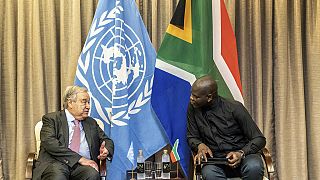
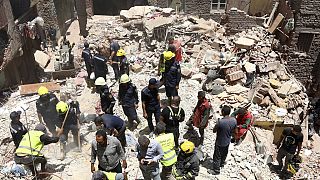
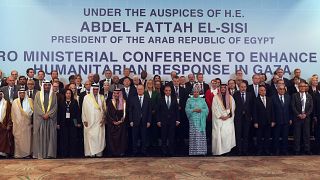

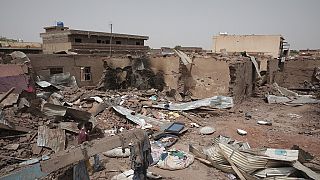
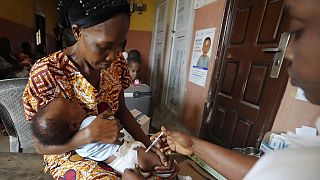

01:30
Urgent Action Needed For Ethiopia's School Children
01:48
Uganda: UNHCR raises alarm over suicide rates among refugees
01:21
Reports that Syria's Assad flees country as rebels take control of Damascus
01:11
South Sudan resumes Tumaini peace talks in Nairobi
01:04
Urgent aid sought for Sudan's isolated regions
01:04
Syria launches counterattacks to halt insurgents' advance